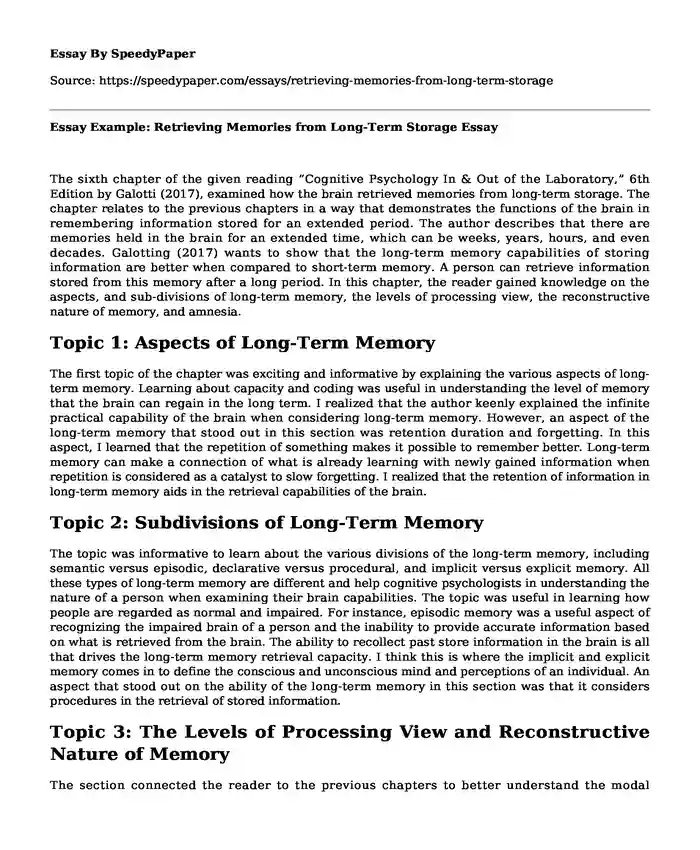
| Essay type: | Analytical essays |
| Categories: | Psychology Intelligence Cognitive development |
| Pages: | 3 |
| Wordcount: | 705 words |
The sixth chapter of the given reading “Cognitive Psychology In & Out of the Laboratory,” 6th Edition by Galotti (2017), examined how the brain retrieved memories from long-term storage. The chapter relates to the previous chapters in a way that demonstrates the functions of the brain in remembering information stored for an extended period. The author describes that there are memories held in the brain for an extended time, which can be weeks, years, hours, and even decades. Galotting (2017) wants to show that the long-term memory capabilities of storing information are better when compared to short-term memory. A person can retrieve information stored from this memory after a long period. In this chapter, the reader gained knowledge on the aspects, and sub-divisions of long-term memory, the levels of processing view, the reconstructive nature of memory, and amnesia.
Topic 1: Aspects of Long-Term Memory
The first topic of the chapter was exciting and informative by explaining the various aspects of long-term memory. Learning about capacity and coding was useful in understanding the level of memory that the brain can regain in the long term. I realized that the author keenly explained the infinite practical capability of the brain when considering long-term memory. However, an aspect of the long-term memory that stood out in this section was retention duration and forgetting. In this aspect, I learned that the repetition of something makes it possible to remember better. Long-term memory can make a connection of what is already learning with newly gained information when repetition is considered as a catalyst to slow forgetting. I realized that the retention of information in long-term memory aids in the retrieval capabilities of the brain.
Topic 2: Subdivisions of Long-Term Memory
The topic was informative to learn about the various divisions of the long-term memory, including semantic versus episodic, declarative versus procedural, and implicit versus explicit memory. All these types of long-term memory are different and help cognitive psychologists in understanding the nature of a person when examining their brain capabilities. The topic was useful in learning how people are regarded as normal and impaired. For instance, episodic memory was a useful aspect of recognizing the impaired brain of a person and the inability to provide accurate information based on what is retrieved from the brain. The ability to recollect past store information in the brain is all that drives the long-term memory retrieval capacity. I think this is where the implicit and explicit memory comes in to define the conscious and unconscious mind and perceptions of an individual. An aspect that stood out on the ability of the long-term memory in this section was that it considers procedures in the retrieval of stored information.
Topic 3: The Levels of Processing View and Reconstructive Nature of Memory
The section connected the reader to the previous chapters to better understand the modal methodology to memory. The sensory memory, long-term, and short-term memory storage capabilities come out clear on this topic. I think the subtopic touches on useful information for cognitive psychologists regarding the elements of information processing in the long-term memory. That determines the capacity to store, retain, and retrieve information for long. It was interesting to notice that there is only one type of memory. However, the form of information processing is what creates the difference for storage purposes. I realized that the level of processing view is an alternative approach to the modal view whereby the memory depends on the initial encoding of the information intended for remembrance. The kinds of cognitive processing help people when encoding information is what determined the capability of long-term memory.
Conclusion
In conclusion, the sixth chapter of the given reading was useful in learning about retrieving memories from long-term memory. It is a section that was interesting and informative for cognitive psychologists and other professionals as it educates on the aspects and sub-divisions of long-term memory. Learning about these elements of the brain is crucial in expanding knowledge of the kinds of memory in the human brain. It was worth noting that the levels of processing view may determine how an individual store and recalls past information from long-term memory.
Reference
Galotti, K. (2017). Cognitive psychology in and out of the laboratory. 6th Edition. Sage Publications, Inc. ISBN13: 9781506351568
Cite this page
Essay Example: Retrieving Memories from Long-Term Storage. (2023, Sep 11). Retrieved from https://speedypaper.net/essays/retrieving-memories-from-long-term-storage
Request Removal
If you are the original author of this essay and no longer wish to have it published on the SpeedyPaper website, please click below to request its removal:
- Essay Sample: Qualities of a Good Salesperson
- Employee Benefit Plans - Essay Example in Performance Management
- Introduction to Counseling, Essay Sample for Your Inspiration
- Essay Sample: Women Character/Gender Relationship in Interpreter of Maladies
- Essay Example. Women and Gender Studies
- The Process of Neurotransmission - Free Essay
- Paper Example. Book Analysis of Superbosses
Popular categories




